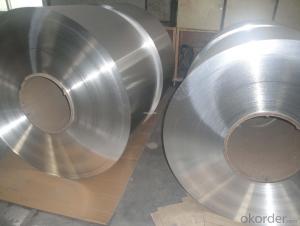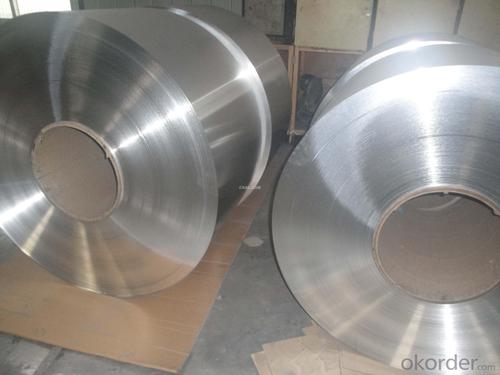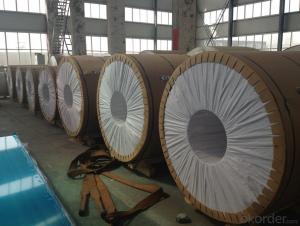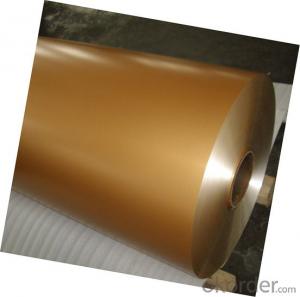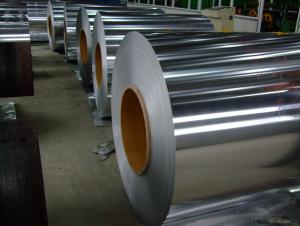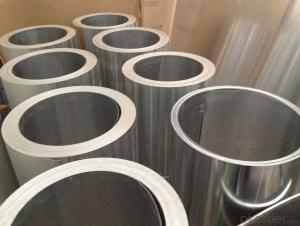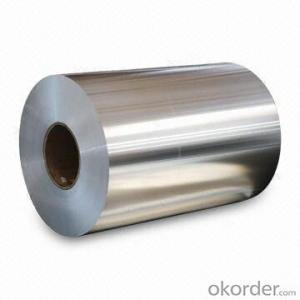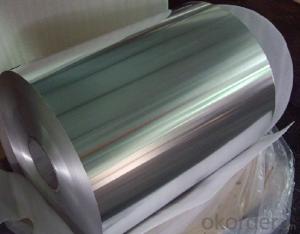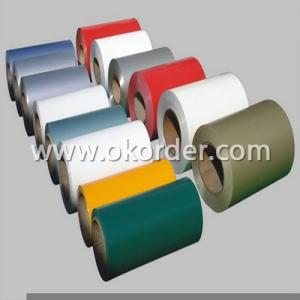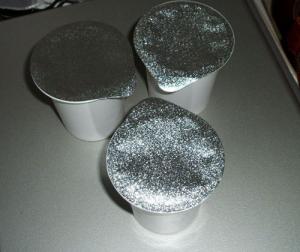Aluminum Coil for Gutter Making in China
- Loading Port:
- Shanghai
- Payment Terms:
- TT OR LC
- Min Order Qty:
- 5 m.t.
- Supply Capability:
- 100000 m.t./month
OKorder Service Pledge
OKorder Financial Service
You Might Also Like
Specification
Product Description
Commodity: Aluminum coil jumbo rolls
Alloy: 1050/1060/1100/1200/3003/3004/3005/3105/5005/5052/5754/5083/6061/8011
Temper: O, H12,H14,H16,H18,H22,H24,H32,H112,T6
Gauge: 0.2mm-8mm
CC and DC material with higher tensile strength and bigger elongation
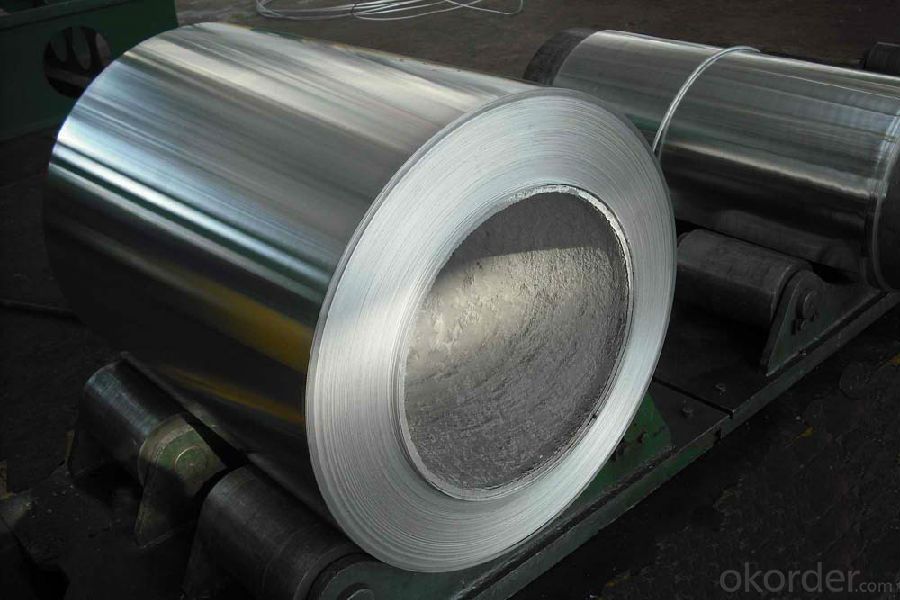
Aluminum Coil - Packaging
Standard Packaging
- Vertical axis packaging
- Core types: Fiber, Aluminum, Steel, Plastic
- Inner Diameter (ID) as required
- Outside Diameter (OD) as required
- Inserts as required
- Separators as required - cardboard or wooden slates
- Wooden Pallets or Crates
Custom Packaging
- Custom packaging, coil weights, inner diameters and outer diameters are available upon request.
Export Packaging
- Export packaging in conformance with IPPC International Standards is available upon request.
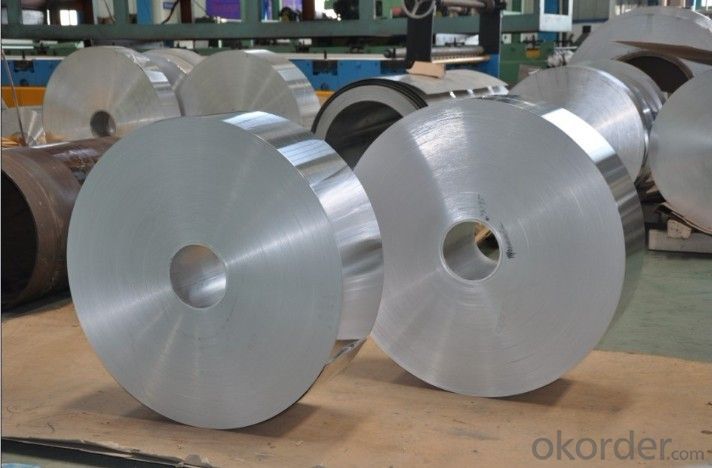
Aluminum Coil - Custom Finishes
Painting, Anodizing and Other Coatings
- Polyester, Acrylic, Silicone Polyester, Kynar (Flouropolymer), Krystal Kote, etc.
- All colors and gloss levels.
- One-side or two sides.
Aluminum Coil - Special Processing
- Cut-to-Length
- Tension Leveling
- Paper Interleaving
- Fine grain, minimum earring, anodizing quality
Our main products for aluminum coils are as follows:
Commodity | Alloy | Temper | Thickness /mm | Width /mm | |
Base material | 1235 1200 1140 8*** | H14 H18 | 0.25-1.00 | 950-1340 | |
Coil for PS | 1050 1060 | H18 | ≥0.2 | 830/920 1030/1050 | |
Sheets for PS | 1050 1060 1070 | H18 | 0.13-0.3 | 650-1300 | |
Strip for venetian blinds | 5052 | H19 | 0.13-0.3 | 300-1300 | |
Coils for composite panels | 1100 3003 3005 | H18/HX2 HX4/HX6 HX8 | 0.03-1.0 | 1000-1300 | |
Coils for other uses | 1100 1235 3004 5052 8011 | H14 H18 H24 O | 0.3-0.4 | 1000-1600 | |
Sheets/Strips for other uses | 5052 | O/H32/H34 | 0.07-2.0 | 950-1550 | |
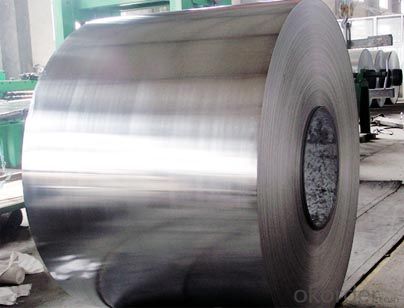
Our Services
CNBM is ready to assist with any product needs or enquiries. We value our customers and welcome your thoughts and feedback.
Please send comments, questions and requests through alibaba or our personal contact so they can be directed to the appropriate department.
About samples: Based on our company rules, a few samples are willing to be offered, but clients are requested to pay freight.
Working time:9:00~17:30(GM+8) from Monday to Friday, but you also can contact with us via personal contact information during our leisure time. We will try our best to offer you service in 24*7 hours.
Any quality, quantity problems are occured, response you will get in time not over more 24 hours after we recieve your complains. Problems will be solved in one week throught friendly negotiation.
FAQ
Q: Can you provide free samples?
A: Yes, free samples will be sent to you on freight at destination.
Q: Can I get your latest catalogue?
A: Yes, it will be sent to you in no time.
Q: What is the MOQ?
A: 5 tons
Q: What are your payment terms?
A: We accept L/C, D/A, D/P, T/T, West Union,etc.
If you are interested in our products, please do not hesitate to contact with us via following information
- Q: Does aluminum undergo corrosion when exposed to seawater?
- <p>Aluminum does not typically corrode in seawater due to its natural protective oxide layer. When exposed to air or water, aluminum forms a thin, dense layer of aluminum oxide on its surface, which prevents further corrosion. This passive layer makes aluminum highly resistant to corrosion in most environments, including seawater. However, under certain conditions such as in the presence of certain chemicals or extreme pH levels, the protective layer can be compromised, leading to corrosion. Generally, though, aluminum is considered a good material for marine applications because of its corrosion resistance.</p>
- Q: Is it safe or permissible to use aluminum in food packaging materials?
- <p>Yes, aluminum is commonly used in food packaging due to its lightweight, durability, and excellent barrier properties against air, moisture, and light. It is used in various forms such as aluminum foil, cans, and flexible packaging materials. However, it's important to ensure that the aluminum packaging is food-grade and complies with safety regulations to prevent any potential health risks associated with aluminum exposure.</p>
- Q: This question asks about the potential dangers associated with exposure to aluminum through consumption of food and drinking water.
- <p>Aluminum exposure in food and water can pose several health risks. Chronic exposure may lead to cognitive dysfunction and Alzheimer's disease, although this link is still debated. It can also cause bone disease by leaching calcium, potentially leading to osteomalacia and osteoporosis. In the nervous system, aluminum can cause neurotoxicity, leading to symptoms like memory loss and impaired learning. Additionally, aluminum may accumulate in the brain, potentially contributing to neurodegenerative conditions. It's important to note that the extent of these risks can vary based on individual susceptibility and the level of exposure.</p>
- Q: Is it safe and practical to use pure aluminum foil for wrapping food for storage?
- <p>Yes, you can use pure aluminum foil to wrap food for storage purposes. Aluminum foil is widely used for its excellent barrier properties against air, moisture, and light, which helps to preserve food freshness and prevent spoilage. It's also heat resistant, making it suitable for both refrigeration and cooking applications. However, ensure the foil is food-grade and avoid using it with acidic or salty foods as these can cause a reaction with the aluminum. Always follow the manufacturer's guidelines for safe use.</p>
- Q: I would like to ask where there is a need for these minerals? How much is it per ton?
- This kind of silica is good, and the price is about 100 yuan / ton.
- Q: This question asks for typical applications of aluminum foil in everyday life.
- <p>Aluminum foil is commonly used for food storage, as it helps preserve freshness and prevents freezer burn. It's also used in cooking, either to cover dishes to retain moisture or to create packets for steaming or baking. In the kitchen, it's often used to line baking sheets to prevent food from sticking. Beyond cooking, aluminum foil is used for insulation, in arts and crafts, and even for cleaning purposes, such as buffing glass or polishing silverware. It's a versatile material found in many households and commercial settings.</p>
- Q: Is aluminum a suitable material for manufacturing electric wires and cables?
- <p>Yes, aluminum is commonly used to make electric wires and cables due to its excellent electrical conductivity, which is about 61% that of copper. It is lighter than copper and more abundant, making it cost-effective. Aluminum's high resistance to corrosion also makes it a durable choice for wiring. Despite its lower conductivity compared to copper, its lower cost and weight often make it the preferred material for power transmission lines and electrical wiring in various applications.</p>
- Q: This question asks about the various applications of aluminum alloys in the automotive industry.
- <p>Aluminum alloys are extensively used in automobiles for their lightweight properties and high strength. They are commonly found in engine components, such as cylinder blocks and heads, to reduce weight and improve fuel efficiency. Aluminum alloys are also used in body panels, wheels, and suspension systems to decrease the overall vehicle weight, enhancing performance and reducing emissions. Furthermore, they are utilized in heat exchangers, such as radiators, and various interior components due to their corrosion resistance and durability. The use of aluminum alloys in vehicles contributes to better fuel economy, improved handling, and reduced environmental impact.</p>
- Q: What are some safety measures that should be taken into account when working with aluminum?
- <p>When working with aluminum, it's important to follow several safety precautions. Always wear appropriate personal protective equipment (PPE) such as gloves, safety glasses, and a dust mask to protect against aluminum dust. Ensure proper ventilation to avoid inhaling aluminum dust or fumes. Use spark-resistant tools when cutting or welding aluminum to minimize the risk of fire. Keep a fire extinguisher nearby and be aware of the flammability of aluminum. Store aluminum in a dry, cool place to prevent it from reacting with moisture. Lastly, be cautious when handling aluminum alloys, as some can be more reactive or hazardous than pure aluminum.</p>
- Q: This question asks whether the energy consumption for producing recycled aluminum is lower compared to the production of new aluminum.
- <p>Yes, producing recycled aluminum requires significantly less energy than producing new aluminum. Recycling aluminum uses only about 5% of the energy needed to produce primary aluminum from bauxite ore. This is because recycling involves melting and recasting the metal, which is a much less energy-intensive process than mining, refining, and smelting new aluminum. As a result, recycling aluminum helps conserve energy and reduces greenhouse gas emissions associated with aluminum production.</p>
Send your message to us
Aluminum Coil for Gutter Making in China
- Loading Port:
- Shanghai
- Payment Terms:
- TT OR LC
- Min Order Qty:
- 5 m.t.
- Supply Capability:
- 100000 m.t./month
OKorder Service Pledge
OKorder Financial Service
Similar products
Hot products
Hot Searches
Related keywords
